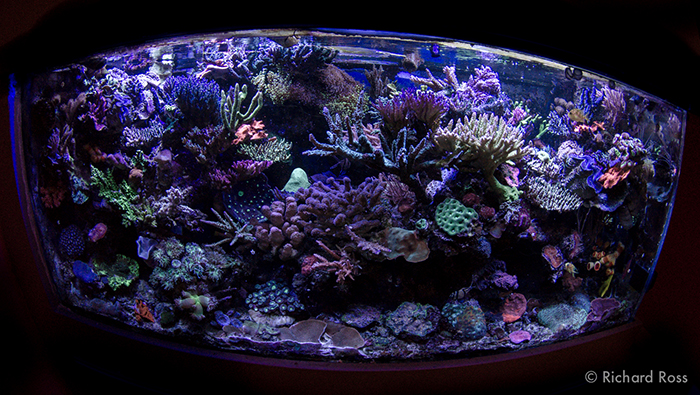I've been at this hobby since 2014, so not so long. But I read and I do some homework but the follow through doesn't always happen as planned. With that being said I guess I need some guidance on a simple yet over analyzed issue. Nitrates and Phosphates! Looking for a reasonable way to start reducing them. More or less the equipment approach. Carbon dosing or running GFO, maybe a combo? I don't have coral in my tank and I'm really anxious to get to the point where I can put the coral that I want in my tank. Now I emphasize on the guidance part because I do have a basic understanding on what I need to do. I do feed a lot because of some of the demanding animals I have. I do 40 gallon water changes, yet dilution isn't always the solution. A little about my setup and equipment. 220g and 60g display tanks that drain into a 75 gallon refugium that houses about 10 gallons worth of cheato algae along with more base rock. It then drains into a 100 gallon stock tank that houses a S300 Eshopps skimmer. I feed LRS and Hakari seaweed and clip LRS nori. I have several tangs, which includes a blue hippo with HLLE. I've tried the GFO and Carbon ROX 0.8 mix before but the tangs did not respond to that solution well. This is where I noticed the hippo started to show signs of HLLE. The levels are high.... very high something astronomical. Red Sea test kit for nitrates are showing something like 40 ppm and I had to use a pool phosphate kit to show something between 2000-2500 ppm, Red Sea color didn't quite match up and my Hanna checker popped up flashing then it laughed at me. To start I'm swapping out all my RODI filters and media, going to pressure wash my mixing barrel, and do 100 gallons of water changes but as I stated before dilution isn't always the solution. Thanks for any suggestions and guidance! ( All my fishies are fat and healthy so theres a positive)
Navigation
Install the app
How to install the app on iOS
Follow along with the video below to see how to install our site as a web app on your home screen.
Note: This feature may not be available in some browsers.
More options
You are using an out of date browser. It may not display this or other websites correctly.
You should upgrade or use an alternative browser.
You should upgrade or use an alternative browser.
Guidance or suggestion?
- Thread starter Justin84
- Start date
- Tagged users None
Randy Holmes-Farley
Reef Chemist
View Badges
Staff member
Super Moderator
Excellence Award
Expert Contributor
Article Contributor
R2R Research
My Tank Thread
- Joined
- Sep 5, 2014
- Messages
- 67,311
- Reaction score
- 63,658
What sort of corals do you want? Many soft corals will likely do fine.
The phosphate is the hard one to bring down from such a high value. I usually prefer GFO, but lanthanum will cost a lot less for that amount of decline.
The phosphate is the hard one to bring down from such a high value. I usually prefer GFO, but lanthanum will cost a lot less for that amount of decline.
Maybe remove some of the live rock from the system would allow your chaeto to get ahead of the phosphates? Treat the rock in a bucket (outside of the system) with lanthanum to avoid impacts to the fish?
@Randy Holmes-Farley I love the look of SPS especially acros.. that’s my goal. Most likely it will be a mix though. I’m in no hurry to load my tank up but I do want to take the corrective steps to get my tank to that level. @KrisReef I’ve thought about adding Marinepure bio-balls or blocks. I don’t want to risk a mini cycle due to too much media removal though. Lanthanum hasn’t crossed my mind but that may be a viable option. As far as carbon dosing, would that be an option after getting my levels lower?
Randy Holmes-Farley
Reef Chemist
View Badges
Staff member
Super Moderator
Excellence Award
Expert Contributor
Article Contributor
R2R Research
My Tank Thread
- Joined
- Sep 5, 2014
- Messages
- 67,311
- Reaction score
- 63,658
Super high phosphate and your slightly high nitrate may not be an issue directly. This SPS tank had 1 ppm phosphate and about 100 ppm nitrate:
https://reefs.com/magazine/skeptical-reefkeeping-ix-test-kits-chasing-numbers-and-phosphate/
Rich’s 150 gallon display, on a 300 gallon system, is running a phosphate level of 1.24 ppm, a level at 24.8 times higher than the often recommended .05 ppm. Photo by Richard Ross.

https://reefs.com/magazine/skeptical-reefkeeping-ix-test-kits-chasing-numbers-and-phosphate/
Rich’s 150 gallon display, on a 300 gallon system, is running a phosphate level of 1.24 ppm, a level at 24.8 times higher than the often recommended .05 ppm. Photo by Richard Ross.

Similar threads
- Replies
- 2
- Views
- 377
- Replies
- 5
- Views
- 286
- Replies
- 9
- Views
- 334
- Replies
- 26
- Views
- 803













